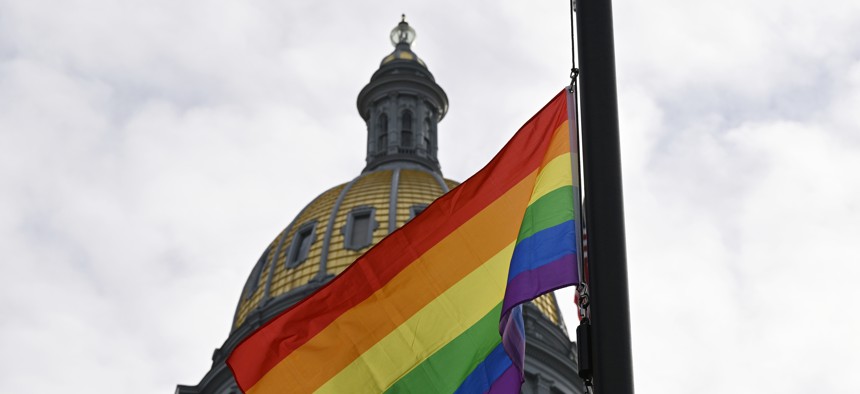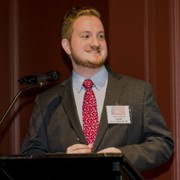Taking a pass on Pride flags in classrooms?
Miami-Dade's school board could ban Pride, Black Lives Matters flags in public schools.

To honor the victims of the shooting at Club Q in Colorado Springs, Colorado, a Pride flag was displayed at half-staff outside the state capitol in Denver for five days last month, to remember each of the 5 people who were killed. Photo by RJ Sangosti/MediaNews Group/The Denver Post via Getty Images
The Miami-Dade School Board this week will vote on a policy to allow only the American flag, the official motto of the State of Florida and flags with academic value to be displayed in classrooms and on school grounds.
The move comes after the board switched to a Republican-aligned majority this election cycle and as conservative school boards across the country have passed similar policies. Detractors have criticized the policy as an attempt to block specific flags, like the Pride flag and Black Lives Matter flag, while its backers say it is to keep politics out of classrooms and keep the focus on learning.
Across the country and around the state, school board members, administrators and teachers have clashed over the purpose of logos and flags of social movements in classrooms. Districts in Indiana, Nevada, and Utah have banned teachers from displaying them in schools since November 2020. A parent is suing the Palm Beach County School Board over displaying a Pride flag in his child’s middle school classroom.
The measure in Miami-Dade was originally put forward by Christi Fraga, who no longer serves on the school board. But a similar policy with some changes from Fraga’s proposal was then sponsored by Roberto Alonso, one of the newly elected conservative board members who was endorsed by Gov. Ron DeSantis.
Alonso told City & State his decision to pick up where Fraga left off came after speaking with parents. He said he also visited schools throughout the county, seeing some classrooms were not displaying the American flag, a violation of state law. He would ensure that the law is reflected in school board policy.
“As the son of two Cuban immigrants that came to this country (and) owe much to this country and to that flag, because we owe our freedom to it, I want to make sure that that was something that was properly displayed,” Alonso said.
The goal of his policy is not to eliminate all other flags, he added. He said he wants teachers to be able to display flags that fit the curriculum they are teaching, such as other nations’ flags for a geography unit, and banners for Black History Month in February and Hispanic Heritage Month in September-October.
“What I really want is for our students and our teachers to focus on what school is about: education. We should not be discussing politics and get all these issues inside of our classrooms,” he said.
LGTBQ advocacy groups and Miami-Dade teachers union representatives say they believe the proposed policy is an attempt to freeze specifically pro-LGTBQ and anti-racist speech from happening in Miami-Dade schools.
Anita Carson, manager of Equality Florida’s rapid-response field and organizing team, said having the flags is a statement of identity, not political beliefs. To her, allowing teachers to have Pride flags in their classrooms allows LGTBQ students to identify a potential ally or supportive adult at school.
“There are LGBTQ members of our community that have a giant range of political ideologies. And so that stance does not work for Pride flags. It makes zero sense. It is a marker for identity. It is not a marker for a political ideology,” Carson said. “By a district specifically stating not just (they) only want the American flag and the Florida flag, but going into the news outlets and telling them specifically, we don't want Pride flags, we don't want BLM flags in our classrooms. They are stating that they don't want kids to be able to receive even a modicum of support in their classrooms.”
Antonio White, United Teachers of Dade first vice president and a U.S. Air Force veteran, told the Miami Herald in November he was concerned that the country’s symbols were being co-opted for other political reasons. “At UTD, our hope is that the display of the American flag always be seen as an inclusive action rather than as a divisive gesture used by certain groups to attempt to co-opt patriotism or smother diversity of thought and gender and sexual orientation,” White said.
Despite the backlash, the policy and others across the country are likely to stand up to potential legal scrutiny, said Clay Calvert, a University of Florida law professor and director of the Marion B. Brechner First Amendment Project. He said that K-12 teachers, unlike university professors, do not have a large amount of academic freedom in the classroom when it comes to their own speech.
Additionally, what is displayed and spoken in classrooms could be considered government speech, which could trump any individual free speech rights teachers may have.
“The government speech doctrine says that when the government is the speaker, it can express its own viewpoint and may discriminate against other viewpoints,” Calvert said. “The school boards are going to argue here that they can choose the curriculum, they can choose the flags that go inside the class, and the government speech doctrine eliminates First Amendment-based challenges to those policies.”
Calvert said the broadness of the policy would also help it in court if challenged because it does not target opinions or beliefs. “It's not completely content neutral, because it does allow the content of the American flag and the content of the Florida state seal. But on the other hand, it applies equally by banning all different flags,” he said.
Alonso said the policy pursuit is not about dividing the community, but returning the district back to doing what it is supposed to do. “I find it really sad that we continue to create division within our communities,” he said. “This is not about dividing our community. It's actually about uniting our community, taking politics out of the classroom, and allowing our kids to get back to the basics and to learning.”
Contact Tristan Wood at twood@cityandstatefl.com and follow him on Twitter: @TristanDWood
NEXT STORY: Florida prosecutors enter into 'deferred prosecution' agreement with Rebekah Jones
